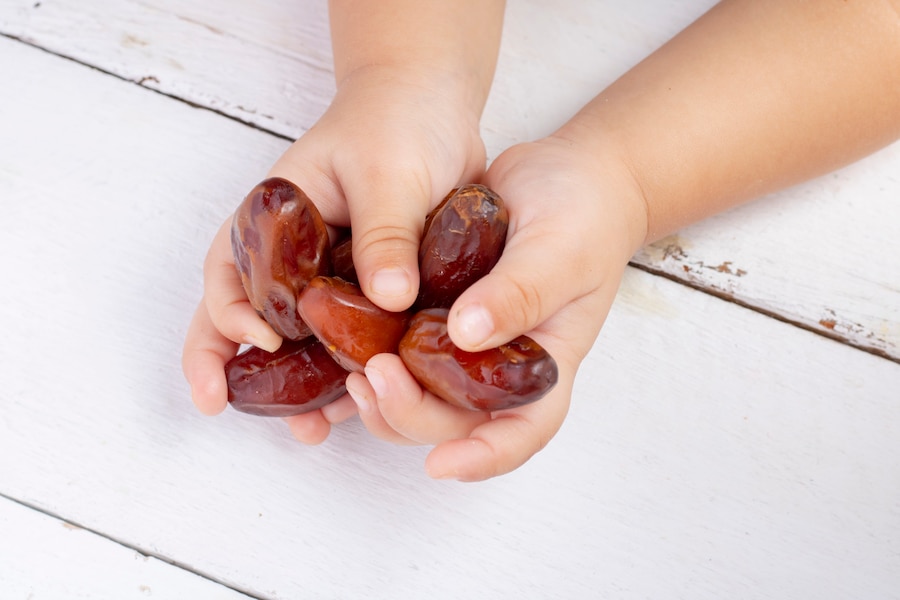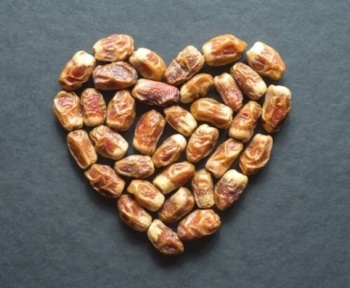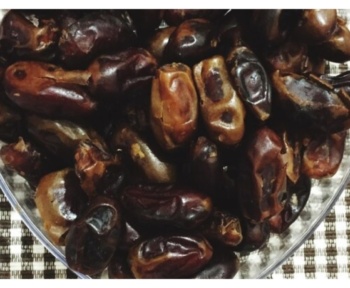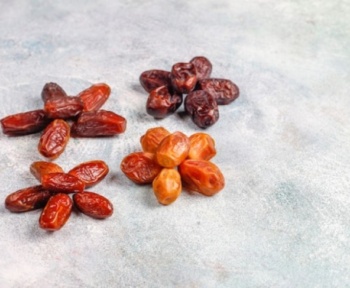Introduction
When it’s time to start introducing solids to your baby, you probably want to pick healthy, safe, and easy foods for their little tummies. Dried dates are a popular snack for adults—sweet, chewy, and packed with nutrients—but are they safe for babies? The good news is yes, but remember a few things before offering them to your little one. Let’s dive into the benefits, the precautions, and how to introduce dried dates in a safe and tasty way for your baby.
What Are Dried Dates?
Dried dates are the fruit of the date palm tree. They’re fresh dates dried out to concentrate their sweetness and nutrients. These little fruits contain natural sugars, fiber, and vitamins and minerals. While they’re a tasty treat, they’re also dense and sticky, which can be tricky for babies. So, are they a safe snack? Let’s take a closer look.
Here’s a snapshot of what’s inside a 100g serving of dried dates:

Dates are packed with vitamins and minerals but also a calorie-dense, high-sugar food. While the sugars are natural, you still want to be mindful of how much you give your baby.
Are Dried Dates Safe for Babies?
When you think about feeding dried dates to your baby, there’s more to consider than just whether they’re healthy. Are they safe to eat? The answer is yes—but with a few precautions. Let’s look at when and how you should introduce dried dates to your baby’s diet.
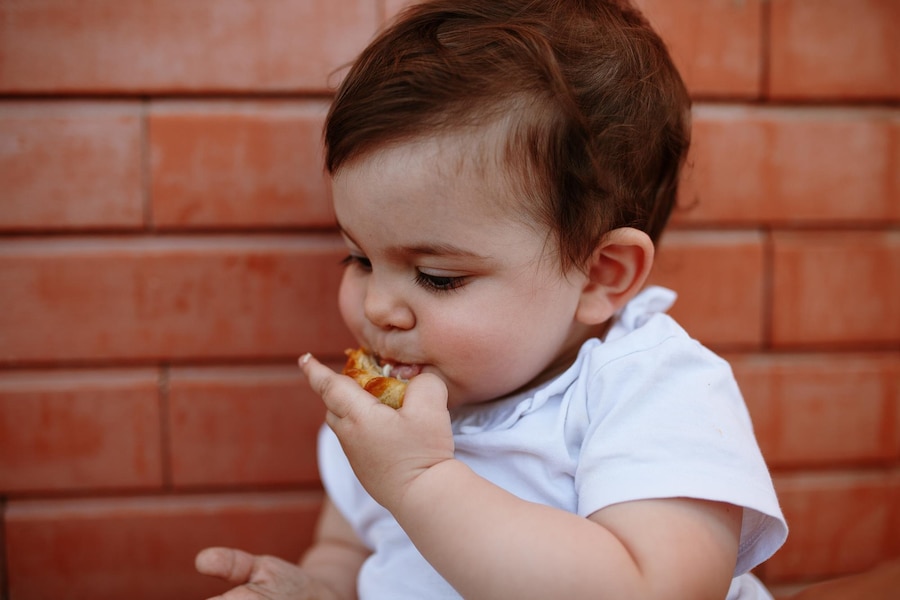
When Can You Introduce Dried Dates?
Most babies are ready to start eating solid foods around six months but always check with your pediatrician before introducing anything new. You can begin introducing dried dates at that age, but preparing them correctly is essential. Hence, they’re safe and easy to eat.
Choking Hazards
This is where things get tricky. Dried dates are sweet and delicious but sticky and chewy, which can be a choking hazard if not appropriately prepared. Babies need soft, easily digestible foods, so when introducing dried dates, you’ll want to make sure they’re softened and chopped into tiny, manageable pieces. A little extra care here goes a long way.
The Nutritional Benefits of Dried Dates for Babies
So, why even bother with dried dates? They’re packed with various essential nutrients that can benefit your baby’s growth and development. Here’s why they’re more than just a sweet snack.
A Great Source of Fiber
Dried dates are loaded with fiber, which helps keep things moving smoothly in your baby’s digestive system. It’s easy for little ones to get constipated when starting solids, so adding fiber-rich foods like dried dates can help prevent that. Plus, fiber promotes regular bowel movements as your baby adjusts to new foods.
Packed with Essential Vitamins and Minerals
Dried dates are loaded with nutrients that support your baby’s development. Here are some key ones:

These are the building blocks your baby needs to grow strong and healthy.
Energy Boost
Dried dates are a natural source of sugar, so they can give your baby a quick energy boost when they’re feeling sluggish. That said, because they’re so sweet, you’ll want to be mindful of how much you’re serving—too much sugar isn’t ideal for little ones. Small portions are the key here.

Antioxidants for Protection
Dried dates are rich in antioxidants, which protect the body’s cells from damage. These antioxidants support a strong immune system, which all babies need, especially during their first year. So, not only are dried dates good for your baby’s body, but they help protect them, too.
How to Introduce Dried Dates to Babies
Introducing dried dates is pretty straightforward but requires extra preparation. Let’s break it down step by step.
Step 1: Wait Until Your Baby Is Ready
Before introducing dried dates (or any new food), ensure your baby is ready for solids. Most babies are prepared by about six months but always check with your pediatrician. You’ll also want to introduce one food at a time so you can keep track of any reactions.
Step 2: Prepare the Dates Properly
Here’s the deal with dried dates: they’re chewy and sticky, so you’ve got to soften them before giving them to your baby. Here’s how:
- Soak them: Soak dried dates in warm water for about 10-15 minutes. This softens them, making them easier to digest.
- Chop or puree: After soaking, chop the dates into tiny pieces or puree them, depending on how old your baby is. If they’re younger, you can blend them into a smooth puree.
- No whole dates: Avoid giving whole dried dates to babies. They’re a choking hazard and are way too harsh for little ones to chew correctly.
Step 3: Start Small
Start with small portions and watch your baby closely. If they enjoy it and don’t have any adverse reactions, you can gradually increase the amount. To make the dates even tastier, try mixing them with applesauce, oatmeal, or yogurt.

Step 4: Keep an Eye on Allergies
It’s always a good idea to watch your baby for signs of an allergy when introducing a new food. It’s unlikely that they’ll react to dates, but you never know. Keep an eye out for signs like skin rashes or tummy troubles.
Precautions to Take When Feeding Dried Dates to Babies
Like anything, dried dates come with a few precautions. Here’s what to keep in mind.
Avoid Overfeeding
Dried dates are high in natural sugars, so it’s easy to overdo it. A little goes a long way. Too much sugar could upset your baby’s stomach or even mess with their appetite for other, more nutritious foods. Stick to small servings, especially when introducing them.
Watch for Choking Risks
Because dried dates are sticky and chewy, they can be a choking hazard if not appropriately prepared. Always soak, chop, or puree the dates before giving them to your baby. Never offer whole dried dates to babies under one year old.
Look Out for Allergies
While allergies to dried dates are rare, it’s still good practice to watch your baby closely when introducing any new food. Start with small portions and watch for any signs of a reaction.

How Much Dried Dates Can a Baby Eat?
Knowing how much-dried date to offer your baby is key. Here’s a simple guideline to help:

Start small and see how your baby does. You can always increase the serving size as your baby gets older and more accustomed to solid foods.
The Benefits of Dried Dates for Your Baby’s Growth
Dried dates do more than taste good—they help support your baby’s growth in several important ways.
Supports Healthy Digestion
The fiber in dried dates helps keep your baby’s digestive system working smoothly. Fiber can help prevent constipation and tummy troubles as your baby starts eating solids. A little dried date can help things stay regular.
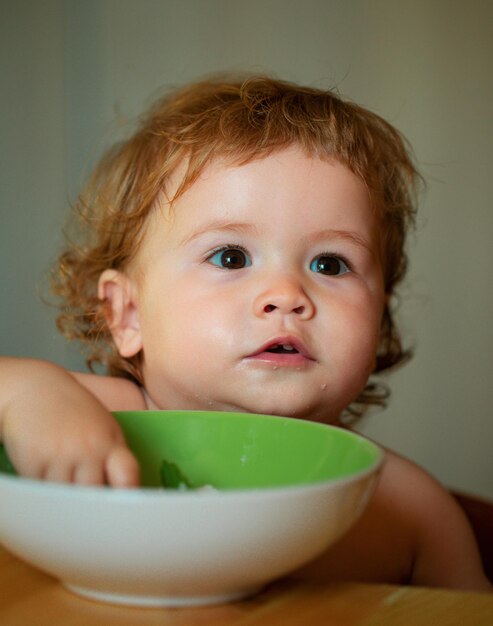
Helps Build Strong Bones and Muscles
Magnesium is essential for bone development, and dried dates are a good source of this vital nutrient. Babies proliferate during their first year, and magnesium helps support healthy bones and muscles.
Promotes Brain Health
The iron in dried dates helps carry oxygen to the brain, which supports healthy brain development. Iron is also vital for creating red blood cells, so it also plays a role in keeping your baby’s blood healthy,
Mistakes to Avoid When Feeding Dried Dates to Babies
While dried dates can be a great addition to your baby’s diet, you should avoid a few common mistakes.
- Feeding whole dates: Whole-dried dates are too harsh for babies and can be a choking hazard.
- Serving too much: Dried dates are calorie-dense and high in sugar, so stick to small portions to avoid upsetting your baby’s appetite for other healthy foods.
- Skipping preparation: Always soak, chop, or puree the dates before offering them. You want to avoid any risk of choking.
Exclusive Insight: Expert Nutritionist’s Take on Feeding Dried Dates to Babies
“While dried dates are nutrient-rich and can support a baby’s growth, it’s crucial to prepare them properly and introduce them in moderation to avoid any choking hazards or sugar-related issues,” says a pediatric nutrition expert, Dr. Emma Reid.
Conclusion
Dried dates can be a nutritious and delicious addition to your baby’s diet, but just like with any new food, you’ll want to take a few precautions. By introducing them at the right age, preparing them properly, and watching for any signs of allergies, you can help ensure that dried dates become a healthy and tasty part of your baby’s solid food journey. So, start small, stay safe, and let your little one enjoy the natural sweetness of dried dates in moderation.
FAQs
You can start introducing dried dates around six months when your baby is ready for solids. Ensure they’re soaked, softened, and chopped into small, manageable pieces.
Yes, but you need to be cautious. While dried dates can be soothing for teething gums, their sticky texture might be hard for babies to handle. Make sure they’re softened and offered in small portions to avoid choking.
Dried dates are high in fiber, which helps promote healthy digestion. However, giving too much at once might upset a baby’s stomach and cause diarrhea. Moderation is key.
Soak the dried dates in warm water to soften them. Then, puree or chop them into small pieces to reduce the risk of choking. Mix them with foods like oatmeal or yogurt for flavor and nutrition.
Both dried and fresh dates have their benefits. Dried dates are more calorie-dense and easier to store, but they’re also stickier, which can pose a choking risk. Fresh dates are softer and might be easier for babies to chew. Choose what works best for your baby’s age and needs.


